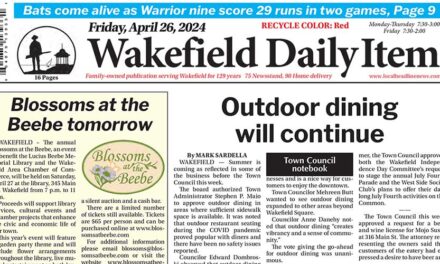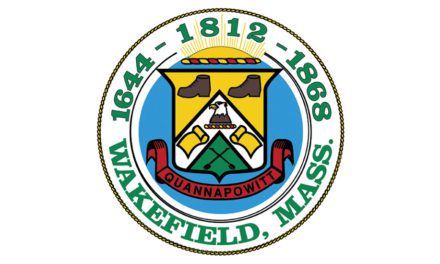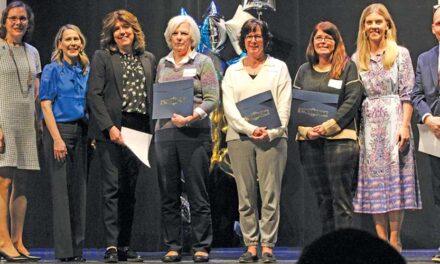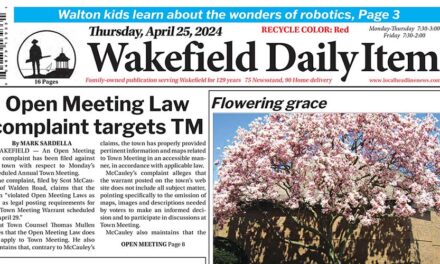Published in the November 5, 2018 edition.
By DAN TOMASELLO
WAKEFIELD — The time to decide is upon us. After months of enduring an onslaught of campaigning and relentless political advertisements, voters will finally make their voices heard when they head to the polls tomorrow, Nov. 6.
Voters in all seven precincts will be casting ballots in the Galvin Middle School cafeteria from 7 a.m. to 8 p.m.
There has already been much interest shown in this mid-term election. Town Clerk Betsy Sheeran reported that early voting, which was available to Wakefield’s registered voters, was a great success.
Early voting began on Monday, October 22 and was available for 12 consecutive days, ending on Friday, November 2. The early voting took place in Town Hall at the Office of the Town Clerk.
During those 12 days, 4,005 ballots were processed and stored in the vault. The ballots are ready to be delivered to the Galvin Middle School on Tuesday by Town Clerk Sheeran and a police officer. Once at the Galvin Middle School, the envelopes will be opened and the ballots will be “fed” into the voting machines.
“I am so pleased with the turn-out. On a good day, there is very little extra parking at Town Hall but the early voters didn’t let that stand in their way,” said Sheeran. “I would think, that with the interest in the mid-term election, Wakefield’s voter turnout should approach 60 percent.”
There are 19,061 residents registered to vote tomorrow.
Races
Wakefield voters in Precincts 1, 2, 3 and 7 — basically Montrose and the North Ward — will get ballots tomorrow featuring 10 contested races.
In the race for governor, Republican Gov. Charlie Baker and Lt. Gov. Karyn Polito are facing off against Democratic challenger Jay Gonzalez and his running mate Quentin Palfrey.
There is a three-way race for U.S. Senate. Democratic incumbent Elizabeth Warren is running against Republican State Rep. Geoff Diehl of Whitman and independent Shiva Ayyadurai.
Two candidates are running for attorney general. Democratic incumbent Maura Healey is facing off against Republican James McMahon.
There is a three-way race for secretary of state. Democratic incumbent William Galvin is running against Republican Anthony Amore and Green-Rainbow Party candidate Juan G. Sanchez.
In the three-way race for state treasurer, Democratic incumbent Deborah Goldberg is facing off against Republican State Rep. Keiko Orrall of Lakeville and Green-Rainbow candidate Jamie Guerin of Northampton.
Four candidates are running for state auditor. Democratic incumbent Suzanne Bump is looking to hold onto her seat. Bump’s challengers are Republican Helen Brady, Libertarian candidate Daniel Fishman and Green-Rainbow candidate Edward Stamas.
Democratic Congressman Seth Moulton is facing off against Republican Joseph Schneider and independent Mary Jean Charbonneau.
Two candidates are running to represent the sixth district on the Governor’s Council. Lynnfield resident and Democratic incumbent Terrence Kennedy is being challenged by independent Vincent Dixon of Winchester.
State Senator Jason M. Lewis, the Winchester Democrat, is being challenged by Reading Republican Erin Calvo-Bacci.
Unique to Precincts 1, 2, 3 and 7 is the race for the Ninth Essex seat in the state House of Representatives. Incumbent Republican Donald Wong of Saugus is being challenged by Saugus Democrat Matthew Crescenzo and Independent Michael Coller, also of Saugus.
In Precincts 4, 5 and 6 — basically the West Side and Greenwood — state Rep. Paul Brodeur, the Melrose Democrat, is running unopposed for reelection.
Others running unopposed in the 2018 state election are District Attorney Marian T. Ryan, Clerk of Courts Michael A. Sullivan and Register of Deeds Maria C. Curtatone.
Ballot questions
In addition to the candidates running for office, townspeople will be voting on three ballot questions.
The most hotly contested ballot question is Question 1, which would limit how many patients could be assigned to each registered nurse in Massachusetts hospitals and certain other health care facilities. A yes vote would limit the number of patients that could be assigned to one registered nurse in hospitals and other health care facilities. A no vote would make no change in state law.
Question 2 would establish a commission that would be tasked with considering and recommending potential amendments to the United States Constitution in order to “establish that corporations do not have the same constitutional rights as human beings.” A yes vote would create the citizens commission to advance an amendment to the United States Constitution to limit the influence of money in elections and establish that corporations do not have the same rights as people. A no vote would not create the commission.
Question 3 would add, “Gender identity to the list of prohibited grounds for discrimination in places of public accommodation, resort or amusement.” A yes vote would keep the current law and a no vote would repeal the law.




